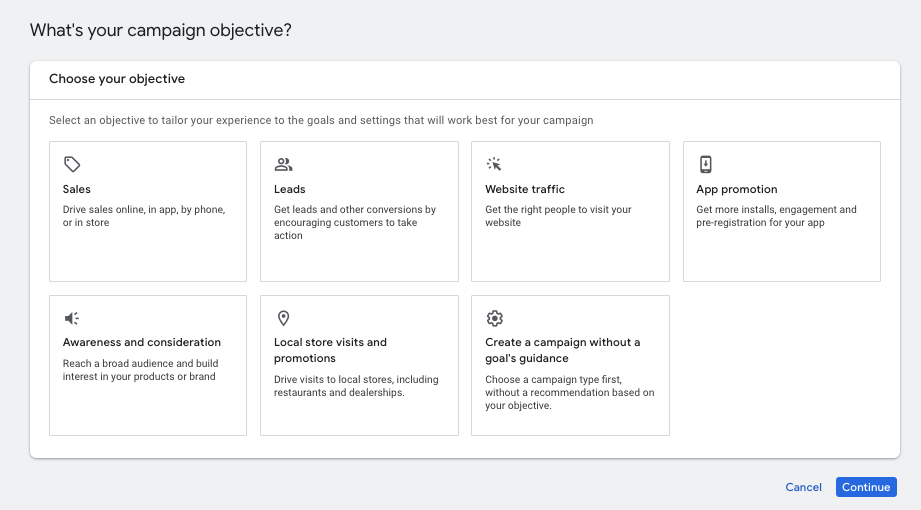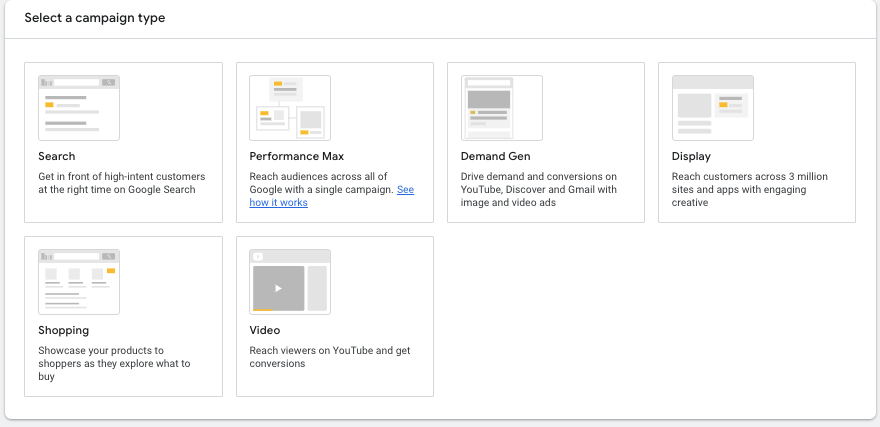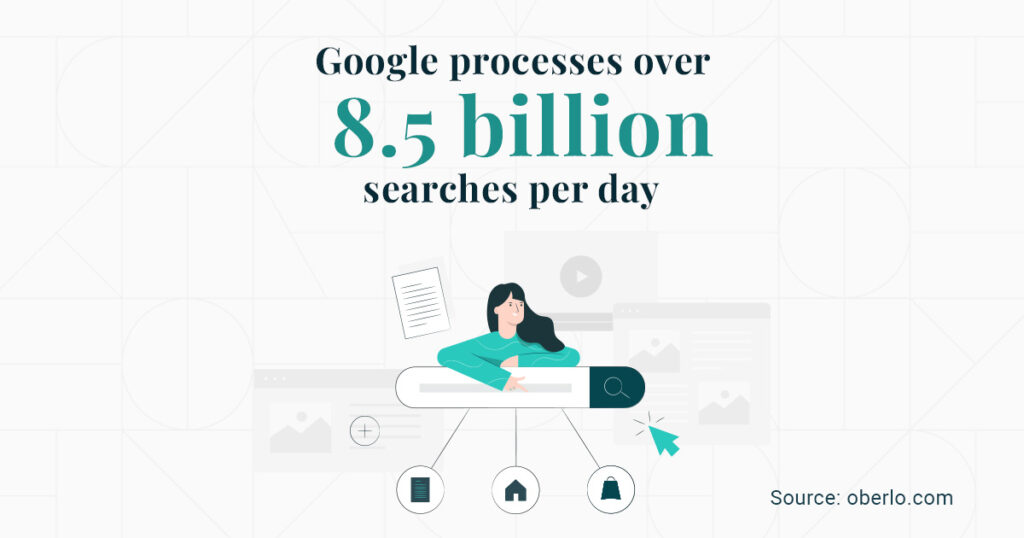Did you know businesses spent over $130 billion on Google Ads in 2023 alone? With such a wide range of options, navigating the world of Google Ads campaign types can be overwhelming, especially for business owners or marketers encountering the variety of Google Ads available in 2024.
With so many options for campaign types and ad formats, it’s essential to understand how to leverage them effectively to achieve desired results for your business.
This guide will help you understand the different Google Ads campaign types available in 2024 and how to leverage them to achieve your business goals.
Table of Contents
What’s your campaign objective?

When setting up a Google Ads campaign, one of the most important decisions is selecting the right campaign objective.
The objective you choose will determine the campaign type, features, and optimisation strategies that Google recommends to help you achieve your desired outcome.
Some common Google Ads campaign types objectives include:
Sales: If your primary goal is to drive online sales or conversions, you would select the “Sales” objective. This will provide suitable campaign types and settings focused on maximising purchases or other valuable actions on your website.
Leads: This objective is ideal if you want to generate qualified leads, such as newsletter sign-ups or contact form submissions, rather than direct sales.
Website Traffic: Best suited for campaigns aimed at driving more visitors to your website, whether they are researching products, consuming content, or exploring your offerings.
Brand Awareness and Consideration: For campaigns focused on increasing brand visibility and encouraging potential customers to consider your products or services, the “Brand Awareness and Consideration” objective would be the right choice. This setting will provide options to enhance brand visibility and encourage potential customers to consider your products or services.
Local Store Visits and Promotions: If your goal is to drive foot traffic to your physical store locations, you can select the “Local Store Visits and Promotions” objective. This will optimise your ad delivery to reach customers who are nearby your stores and most likely to visit and make purchases
App Promotion: Promote your mobile app and acquire new users with the “App Promotion” objective. This will surface campaign types and features tailored for app promotion, such as app install ads.
By carefully aligning your campaign objective with your overall business goals, you can leverage Google’s recommendations to create more effective and efficient advertising campaigns that deliver meaningful results.
Choosing the Right Google Ads Campaign Type for Your Business

Google Ads offers several campaign types, each with its own unique benefits and use cases. Here’s a quick overview of the main options available and their pros and cons:
Search Campaigns
These text-based ads appear at the top of Google search results, targeting users actively searching for your products or services.
Pros:
- High Intent Targeting: Reaches users actively searching for specific products or services.
- Text-Based Flexibility: Allows for focused messaging based on keyword relevance.
- Immediate Visibility: Appears at the top of search results, increasing visibility.
Cons:
- Competitive Costs: High competition can lead to increased costs per click.
- Limited Visual Appeal: Text ads may not capture attention as effectively as visuals.

Display Campaigns
Display ads, including images and videos, are shown on websites across the Google Display Network, helping you reach a wider audience.
Pros:
- Wide Reach: Access to a vast network of websites and apps.
- Visual Engagement: Utilises images and videos to attract attention.
Cons:
- Lower Intent: Reaches users who may not be actively looking for your product.
- Ad Blindness: Users may ignore display ads if they are too frequent or not engaging.
Video Campaigns
Video ads are displayed on YouTube and other video platforms, allowing you to tell a more engaging story about your brand.
Pros:
- High Engagement: Videos are compelling and can convey complex messages quickly.
- YouTube Integration: Access to a large audience on YouTube and partner sites.
- Creative Flexibility: Various ad formats to suit different objectives.
Cons:
- Production Costs: Creating high-quality video content can be expensive.
- Ad Skipping: Viewers may skip ads, reducing impact unless targeting is precise.

Shopping Campaigns
These product-focused ads showcase your offerings with images, pricing, and other details, making it easy for users to find and purchase your products.
Pros:
- Product Focused: Showcases product details like images and prices directly in the ad.
- Increased Click-Through Rate: Highly relevant ads can lead to better CTRs.
- Ease of Comparison: Allows users to compare products easily.
- Ideal for E-commerce Businesses: Perfect for businesses selling physical products online, providing a streamlined way to advertise their inventory.
- Integration with Google Merchant Center: Seamlessly connects with Google Merchant Center to pull product data, ensuring your ads are always up-to-date.
Cons:
- Complex Setup: Requires a Google Merchant Center account and product feed management.
- Limited to Physical Products: Not suitable for service-based businesses.
App Campaigns
Designed to promote mobile apps, these ads help you acquire new users and drive in-app actions.
Pros:
- Cross-Platform Reach: Promotes apps across Google Search, Display, and YouTube.
- Automation: Utilises machine learning to optimise ad placements and targeting.
- Diverse Ad Formats: Supports text, image, and video ads tailored for app engagement.
Cons:
- Limited Control: Automated settings may not allow for specific targeting preferences.
- Higher Costs: App campaigns can be costly, especially if not carefully monitored.
Demand Gen Campaigns
Demand gen campaigns focus on generating interest and demand for your products or services. These campaigns often use a mix of search, display, and video ads to reach potential customers at various stages of the buyer’s journey
Pros:
- Holistic Approach: Uses a mix of ad formats to engage users at different funnel stages.
- Brand Building: Helps establish and nurture brand recognition and interest.
- Targeted Awareness: Reaches potential customers during the research phase.
Cons:
- Longer Sales Cycle: Requires patience as users progress through the buyer’s journey.
- Resource Intensive: May require more effort in content creation and management.
Performance Max Campaigns

Performance Max is a goal-based campaign type that allows you to access all Google Ads inventory from a single campaign. It uses Google’s AI optimisation to drive performance based on your specified conversion goals, delivering more value by optimising across channels in real-time
Pros:
- All-In-One Solution: Accesses all Google Ads inventory from a single campaign.
- AI Optimisation: Uses Google’s AI to optimise across channels for maximum performance.
- Comprehensive Insights: Provides a holistic view of campaign performance.
Cons:
- Less Control: AI-driven optimisation may not align with your specific business strategies.
- Complexity: Requires expertise in multiple platforms and data analysis
- Less Control Over Keywords: Unlike traditional search ads, you have less control over the keywords that trigger your Performance Max ads, relying more on Google’s automation and machine learning to match user intent.
The campaign type you choose should align with your marketing goals, target audience, and overall business strategy. Carefully consider the unique benefits of each option to determine the best fit for your needs.
Finding the Perfect Fit for Your Business
The best campaign type depends on what you’re trying to achieve, who your target audience is, and your overall business strategy. Consider what each campaign offers and pick the one that best suits your needs.
By understanding your goals and the different Google Ads campaigns, you’re well on your way to creating winning campaigns that take your business to the next level!
Need help navigating the different Google Ads campaign types? Contact a NetStripes’ ad specialist to maximise your ad efficiency and achieve your business goals.



